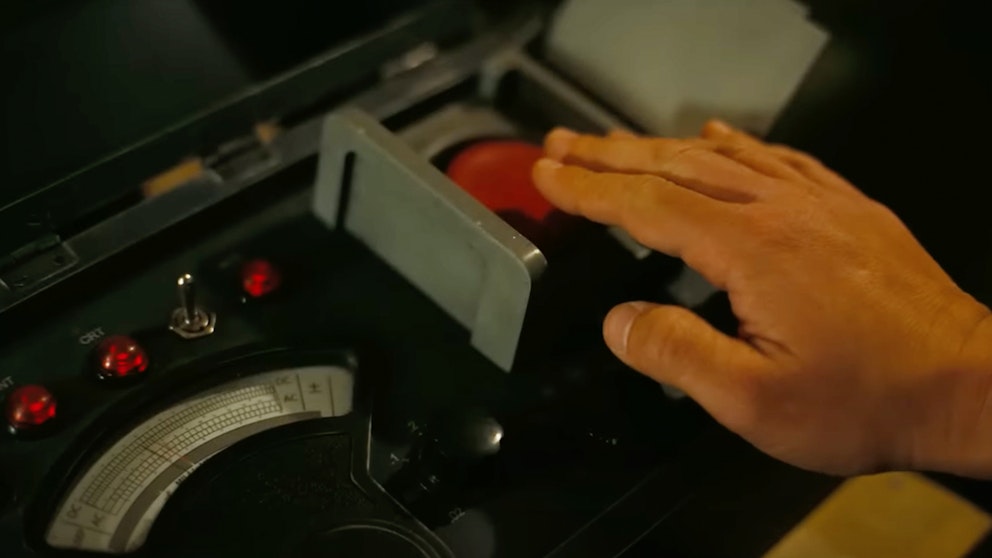Oppenheimer (Christopher Nolan, 2023): US, UK
Reviewed by Riley McCaffrey. Viewed at the Santa Barbara International Film Festival.

In the realm of cinematic storytelling, few films manage to capture the essence of their subject matter with the depth and complexity that Christopher Nolan’s “Oppenheimer” achieves. This meticulously crafted narrative dives deep into the life of J. Robert Oppenheimer, portrayed by Cillian Murphy in what I would call a career-defining performance. “Oppenheimer” unfolds in three distinct acts, meticulously charting the protagonist’s journey from an ambitious young physicist to the so-called “father of the atomic bomb.”
The first act begins in the early 1940s introducing us to Oppenheimer’s early years, tracing the physicist’s journey from his role as a theoretical physicist to becoming the director of the Los Alamos Laboratory in New Mexico, setting the stage for the monumental achievements and moral quandaries to follow.
It is in the second act, however, where Nolan’s directorial genius truly shines. At the heart of “Oppenheimer” lies a sequence that distills two hours of escalating suspense into a singularly climactic moment—the testing of the atomic bomb. Christopher Nolan crafts this moment with a meticulousness that mirrors the painstaking precision of the scientists it portrays; intertwining the personal stakes for Oppenheimer and his team with the monumental implications of their work. The tension is compounded by the reveal that there exists “a less than 1% chance” that the bomb’s detonation could ignite the Earth’s atmosphere, annihilating all life on the planet. As the moment of truth approaches, the tension reaches a peak as a man stands with his finger poised over a red button, granted the power to abort the test at the last possible second. This image becomes a powerful symbol of the razor-thin line between groundbreaking achievement and catastrophic failure. Just when it seems the audience can bear no more, the film delivers its most breathtaking moment. The bomb test scene itself is a cinematic marvel, a payoff that rewards the audience’s emotional investment with one of the most beautiful and haunting shots ever captured on film. As the countdown reaches its final moment, and the screen is engulfed in brilliant light, there’s a profound silence that speaks volumes. In this near-minute-long pause, Nolan invites the audience to reflect on the paradox of the achievement: the creation of something so devastatingly beautiful yet unspeakably destructive. The visual majesty of the explosion achieved through Nolan’s commitment to practical effects and IMAX cinematography, is not just a spectacle but a pivotal narrative and thematic moment. It encapsulates the duality of scientific progress, —its capacity to both create and destroy.
The third act shifts its focus from the spectacle and tension of the atomic bomb’s creation and testing to the profound aftermath and its resonant message. This final segment of the film delves deep into the ethical, psychological, and societal ramifications of unleashing such a monumental force upon the world. It’s here that Nolan’s storytelling prowess is most evident, as he navigates the complex landscape of moral consequences and the burden of responsibility that rests on the shoulders of J. Robert Oppenheimer and his team. As the dust settles following the bomb’s detonation, the narrative slows to explore the inner turmoil and public fallout experienced by Oppenheimer, portrayed with compelling depth by Cillian Murphy. The character’s journey through triumph, doubt, and introspection serves as a mirror to the audience’s own reckoning with the film’s themes. This act cements “Oppenheimer” not just as a historical drama but as a profound commentary on the human condition and the ethical boundaries of innovation.
In conclusion, despite its lengthy runtime, “Oppenheimer” maintains a gripping pace, thanks to its clear three-act structure and the suspense-building of its central scene. Nolan has crafted a film that is both a technical marvel and a deeply human story of ambition, responsibility, and the irreversible impact of scientific discovery. Cillian Murphy’s nuanced portrayal of Oppenheimer anchors the film, offering a window into the soul of a man whose legacy is forever entwined with the most devastating weapon ever created.It is a testament to Nolan’s prowess as a filmmaker and a reminder of cinema’s ability to explore the most consequential moments of human history.
About this entry
You’re currently reading “Oppenheimer (Christopher Nolan, 2023): US, UK,” an entry on Student Film Reviews
- Published:
- 03.02.24 / 4pm
- Category:
- Films, Santa Barbara Film Festival 2024
66 Comments
Jump to comment form | comments rss [?]